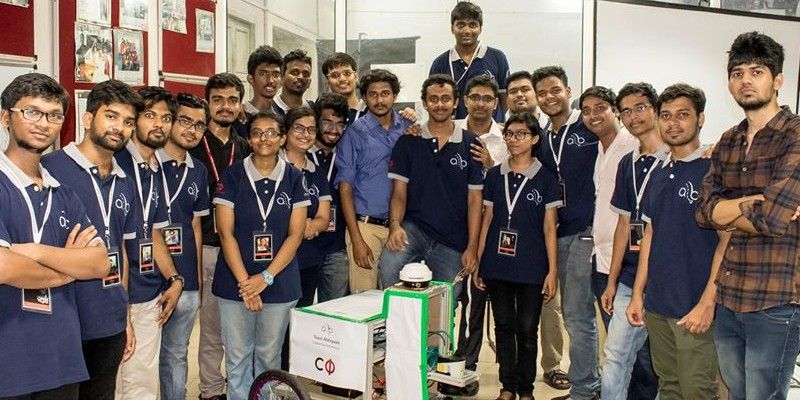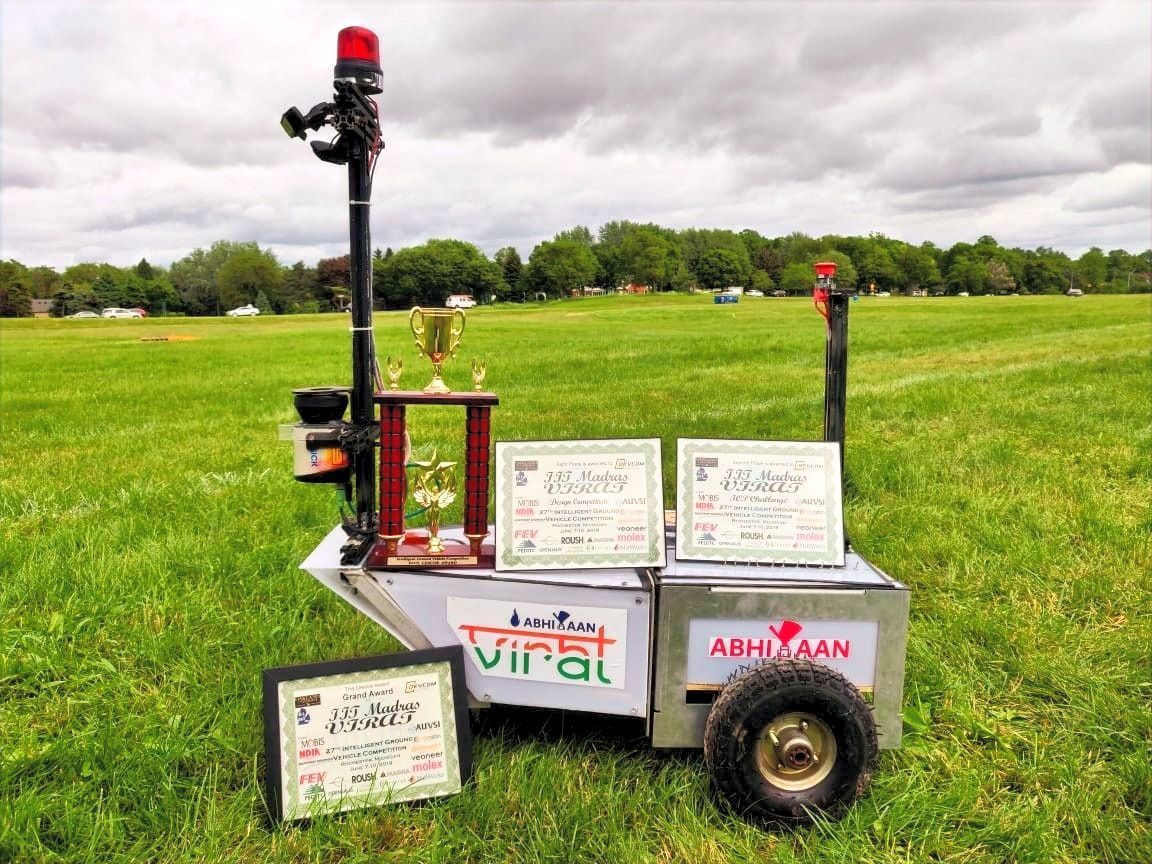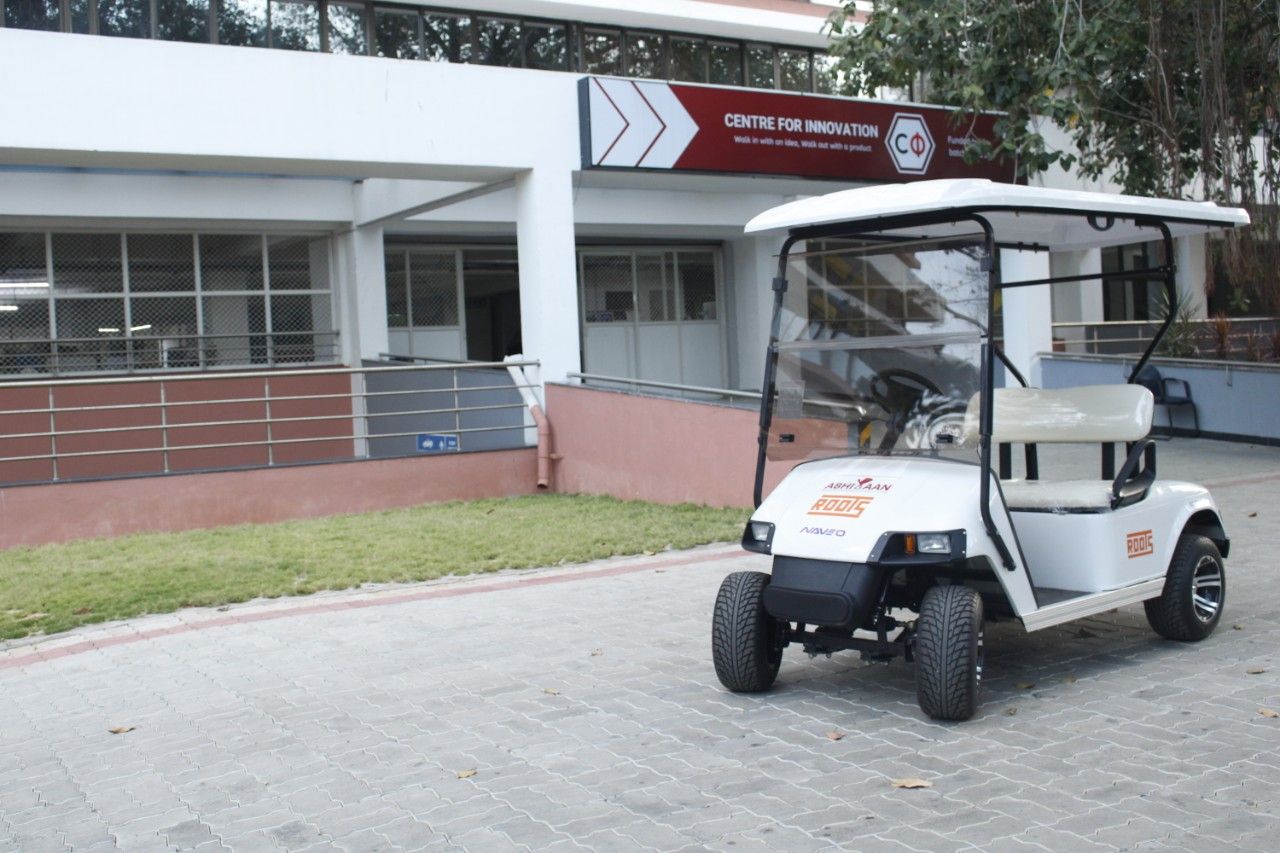Road accidents in India are an everyday phenomenon. It’s a sad reality that Indians die more in road accidents than any disease outbreak. According to various media reports, road accidents had claimed about 1.5 lakh lives in 2018.
Even during the coronavirus lockdown between March 24 and May 30, recent reports revealed that India recorded about 1,461 road accidents, where about 750 people lost their lives. This is what Team Abhiyaan from IIT-Madras tries to solve — the menace of road accidents caused by human error.

Team Abhiyaan
Conceptualised in 2014, the student team is building an autonomous, intelligent, and safe ground navigation system to eliminate the chances of accidents due to human error.
“According to reports, 94 percent of road accidents are caused due to human error. We are solving this issue by developing an autonomous navigation system that will replace the human being as a driver,” says Aakash Arul Mozhi Nambi, a senior member of Team Abhiyaan.
Autonomous vehicle solutions
According to the members of Team Abhiyaan, their journey began when they developed their first autonomous navigation ground robot Kernel 2.0. Aakash explains that the product is capable of navigating between two GPS waypoints fed into the software.
Kernel 2.0 was presented at the Intelligent Ground Vehicle Competition (IGVC) 2018, where the team bagged the 10th position among 45 other global competitors.
Later, it developed the Kernel 2.0 model, and launched Virat — an enhanced controller, algorithm planning, and sensor fusion systems — along with other capabilities of Kernel. Virat was presented at the IGVC 2019, where the team scored the second place among other global competitors.
“After developing the ground vehicle robots and achieving success, we are now focussing on building actual cars. While the procurement of the parts got delayed over coronavirus lockdown, we are currently working on the software, and have created a simulating environment in our computers to test the software,” Aakash says.
At present, Team Abhiyaan is building a prototype of its autonomous electric vehicle Bolt which will have control, and can operate in a dynamic environment. The vehicle, which is currently in the early stages of development, will be showcased at IGVC 2021.
Bolt will be equipped with drive-by-wire systems for software, and will have mechanical controls for the throttle, brake, and steer. The vehicle, designed for urban roads, will have computer vision, cameras for identifying traffic signals and lanes, and will be able to control its journey.

Virat. Credit: Team Abhiyaan
Safety, security, and applications
Speaking about the safety and controls of the vehicles, Team Abhiyaan alumni Prathyusha explains that the ground navigation vehicles — Kernel 2.0 and Virat — are equipped with several sensors to detect and avoid dangerous situations on roads. Further, in case the autonomous system of the vehicles turns rogue and uncontrollable, the vehicle will automatically shut down.
However, in Bolt, the team is working on a manual switch feature which will allow the driver to switch the vehicle to manual mode in case the autonomous system breaks down.
Speaking about the application, the team members say that the ground vehicles can be used for completing last-mile delivery services by ecommerce companies. The team also proposes the application of the vehicles in load transportation assistance to soldiers, as it is designed to carry heavy loads such as arms and ammunition.
Besides, the automatic navigation system software can be retrofitted in other vehicles, provided some hardware parts are changed. However, the team is currently focusing on building autonomous vehicles and will consider the retrofitting aspect moving forward.
Akash says that it costs about Rs 10-12 lakh to build these ground navigation vehicles. However, the cost for building Bolt is not yet certain, as the team is yet to procure parts and begin the hardware work.
“We are currently focusing on developing the technology and have not yet considered the pricing from the product point of view. The cost is high right now as we are using very high-end sensors and components for the competition guidelines. In a scalable model, for real-life application the cost will be much lesser,” he adds.

Bolt. Credit: Team Abhiyaan
Funding
According to Sathyan Subbiah, Associate Professor in the Department of Mechanical Engineering, IIT-Madras, the execution of projects is completely taken care of by the students.
“This is entirely a student-driven team, and faculties only play an administrative role. The students pool in themselves, come up with ideas, and participate in competitions. While the institution does provide some funds for procurement of the parts, the students mainly look for sponsors to fund their projects,” Sathyan says.
The team is supported and sponsored by entities such as Roots Industries India Limited, Septentrio, Ansys, and Sparton. Apart from participating in global competitions, the team is also looking to work with suitable startups who would like to test the vehicles and deploy them.
(Edited by Suman Singh)
Want to make your startup journey smooth? YS Education brings a comprehensive Funding and Startup Course. Learn from India's top investors and entrepreneurs. Click here to know more.
Link : https://yourstory.com/2020/06/iit-madras-team-abhiyaan-autonomous-vehicle-bolt-virat
Author :- Shreya Ganguly ( )
June 11, 2020 at 05:25AM
YourStory

